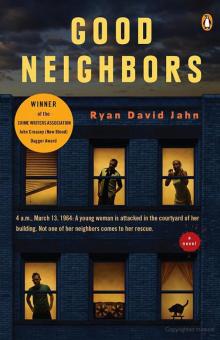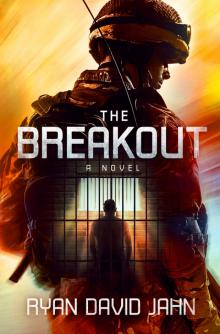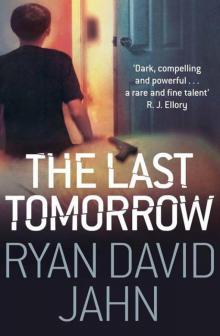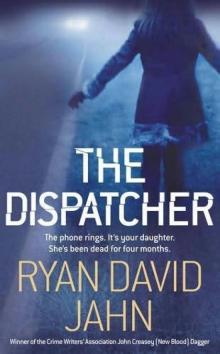- Home
- Ryan David Jahn
Good Neighbors Page 7
Good Neighbors Read online
Page 7
He stands and walks to the living-room window.
He sees several apartment lights turning on, he sees several human shapes moving to their windows, some of the shapes alone, some of them standing in twos. In one window he sees a woman, a man, and a small child, maybe six years old, all standing together like in a family portrait.
Larry’s telling Diane that he’s tired and he just wants to go to bed, can’t they talk about it in the morning – the evasive son of a bitch – when the screams come, and Diane momentarily forgets the fight and turns toward the window, and then walks to it for a better view.
The lights in the courtyard make it possible to see out fairly well even though it’s night, but Diane doesn’t see anything, just empty space. Four benches, some flower beds, and concrete.
A moment later, Larry is standing beside her.
‘What is it?’ he says.
‘I don’t know.’
‘Sounded like screams.’
‘Or a dog yelping.’
‘It sounded human.’
‘Are you sure?’
‘No.’
‘I think it sounded like a dog yelping.’
Thomas and Christopher both walk toward the living-room window, closer and closer, until their reflections and the reflection of the living room surrounding them disappear, and they can see the courtyard clearly, without having to look through themselves.
‘Maybe we should turn off the light,’ Christopher says. But neither of them move to do so.
‘I’m gonna go see if Ron and Anne heard anything,’ Bettie says, turning away from the window and looking at Peter, who seems bemused, who is simply sitting on the edge of the bed, staring into the ether.
‘Okay,’ he says without looking up at her.
‘Are you all right?’
He nods.
‘You sure?’
He looks up at her and smiles.
‘Yeah,’ he says. ‘I’m sure.’
‘All right,’ she says, stroking his face. ‘I’m gonna go see.’
‘Okay. I’ll be out in a minute.’
She walks to the door, pulls it open, and then walks through it.
In the living room, Anne, Peter’s wife, who Bettie thinks is a sweetheart, and Ron, Bettie’s husband, stand in front of the living-room window. Both of them are motionless as statues; they simply stand there, looking out.
Bettie says, ‘Did you guys hear that?’
‘Sounded like screaming,’ Ron says, turning to look her as she walks up to him and puts an arm around his waist. His body is warm against hers, and a bit sticky, and he smells of sex. The entire living room smells of sex. Bettie glances at Anne, who is wearing a thin pink robe, and then she looks out the window.
‘Have you guys seen anything?’
Anne shakes her head.
‘Not yet,’ she says. ‘Oh, wait, there.’
She points.
‘I think I see something too,’ Bettie says.
Peter walks out of the hallway in a pair of wrinkled slacks, his pale belly shirtless.
‘What is it?’ he asks.
13
Kat crawls out of the night shadows that have laid themselves across the street-side of the apartment complex and makes her way into the lamplit courtyard. She is pulling herself forward on her arms, which scrape and bleed against the concrete beneath her. But she doesn’t care about the pain in her arms; she just wants to get away from the man with the knife.
She just wants to get away.
Her shoulder itches. She thinks he stabbed her. There’s a burning sensation inside her, behind her armpit, and she thinks he stabbed her.
She struggles to her feet, first getting them flat on the ground beneath her body and then using her arms to push herself up. She looks over her shoulder into the darkness but does not see the man with the knife nor the glimmer of the blade.
Maybe he left. Maybe the lights in the courtyard scared him. Maybe he didn’t want to be seen and he left. She would be okay then. She would be okay if he just left. Someone could fix her up, make her stop hurting, and she would be okay.
She looks around the courtyard. It’s about thirty feet wide and fifty feet deep and concrete except for a round flower garden in the middle and a few half-circle flower gardens along the edges where the concrete meets each of the four buildings that make up the complex. There are four benches surrounding the central flower garden. The buildings themselves stand five stories high. Kat has no idea how many apartments are in the complex but she knows that about half of them look in on the courtyard and she sees that several of the windows are lit up. She has never seen so many of the apartments with their lights on when she’s come home from work. There must be a dozen living-room lights on. There must be thirty or more people standing on the other side of lit and unlit windows. She can see their faces looking down at her.
She can see the whites of some of their eyes.
‘Help,’ she says. ‘Someone help me.’
She looks at the faces of the people in their apartments, and they look down at her. She recognizes some of them: Larry and Diane Myers in their second-floor apartment; and Thomas Marlowe, who helped her carry her groceries inside once; and Anne Adams, who, because Kat is Italian, always asks her about pasta sauces. There are dozens of others. She can see them looking down on her through their living-room windows as if she were nothing more than an image on a television screen. And how many can’t she see? How many more are standing and staring at her from far back in their darkened living rooms, out of sight?
‘Help,’ she says again.
She hears the sound of footsteps behind her and she looks back over her shoulder, and the first thing her eye sees is a tear in her white coat – no not a tear, a cut, a slice – and it’s leaking a dark burgundy liquid that smells like metal tastes, and then she looks past her own shoulder and she sees him. Oh God. I’m sorry, God, I didn’t mean to take your name in vain; I’m just so gee-dee scared, and I hurt so bad, and there he is. Oh God, he didn’t go away – he didn’t go away. He didn’t go away. Oh God, get me out of this. The man with the rust-spotted knife walks out of the shadows. He is six feet tall and he must weigh a hundred and eighty pounds and his eyes shine with malevolence and his right hand is holding that big kitchen knife and his brown construction boots are speckled with blood. With her blood.
He walks toward her.
Kat starts crying.
‘Oh, God, no. No,’ she says. ‘Please – please. Please,’ she says.
But he keeps coming for her. The man keeps walking and no one does anything to stop him. They just stare from their living rooms. They just look down at her with their wide white eyes.
Then he’s here, the man with the knife, and he grabs a handful of her hair in his fist. She can smell his sweat. She can see the blackheads on his nose. She can see the veins bulging in his neck, and she can see veins in his eyes like fire coursing down the side of an active volcano.
He throws her to the ground.
14
Thomas pulls down the window shade, blocking his view of the terror below. He couldn’t see everything that was happening, but he saw enough to know he couldn’t stand to see more.
‘I can’t watch that,’ he says.
‘I know what you mean.’ A pause. ‘Should we call the police?’
Thomas thinks about it a moment, and at first it seems like the right thing to do, but then he remembers all those faces he saw – standing, staring down at the courtyard from their living-room and bedroom windows; dozens of faces, dozens of them – and he thinks of the police here, interrogating him for hours about what he saw, maybe asking him to come down to the station to look through a book of photographs. And he thinks of his grandfather’s gun.
‘I’m sure somebody already has,’ he says finally. ‘We don’t want to tie up the lines with redundant calls.’
After a moment’s thought, Christopher nods.
‘Probably right.’
‘Poor girl,
though. What if it had been Samantha?’ He pauses, as if to think about that. ‘We should move. Neighborhood’s going downhill fast.’
Christopher looks away from him for a moment, seemingly lost in thought. He bites his lip. He looks down and scratches the web on his left hand between his thumb and index finger. Finally, he looks up.
‘Do you really have a daughter?’
‘What?’
Thomas can feel anger flushing his face, hot and itchy, but if Christopher notices, he hides it well – he just stares back, unflinching.
‘Do you really have a daughter?’ he says again. ‘I see pictures around the apartment. And I know your stories. You’ve got plenty of stories: Samantha getting baptized even though you’re not really religious because your wife insisted, Thanksgiving with the in-laws, all of that . . . but . . . I don’t know. Maybe the stories don’t quite add up, you know? Maybe . . . I just . . .’ And with that – with it right out in the open – Christopher does break eye contact. ‘I don’t know. I’m sorry I said anything.’
Thomas doesn’t know how to respond. He looks at Christopher and then looks away. He walks to the coffee table, picks up the picture there, and stares down at it for what seems to him like a very long time. He sets it down again.
‘Does anyone else think I’m lying?’ he asks finally. ‘Doug? Larry, maybe?’
Christopher shrugs.
‘I don’t know. I don’t think so. No one’s said anything about it.’
Thomas picks the picture back up from the coffee table and looks at it for a while longer, and for some reason he feels like he’s about to say goodbye to someone. It feels the same as it did when his mother left him standing on the lawn with a cardboard suitcase in his hand, left him standing next to grandma.
‘Wave goodbye,’ grandma said, and he did. He waved goodbye.
‘I bought the first picture frame, this picture frame,’ he says, holding it up, ‘three years ago. It had a picture in it already – a picture of a woman and a little girl standing in front of the Golden Gate Bridge – so that you could imagine what your picture might look like inside the frame once you got it home and put it there. Only when I got the frame home, I had nothing to put in it, so I just set it on my coffee table and left the picture it came with inside. But sometimes, you know, when there was nothing on TV and I didn’t feel like reading, I would, I don’t know, just kind of look at that picture and wonder who that woman was. Was she nice? Did she smile easily at silly jokes? Was that little girl really her daughter? Did she get good grades in math? Maybe she could be my daughter too.’ Thomas stops and simply looks at the picture a moment longer before he continues. ‘About six months after I bought the first picture, I found another picture of the same woman. It was in a magazine, a cigarette advertisement. She was alone in that picture. I bought the magazine, and I took it home, and I cut her picture out and I framed it. After that, I guess I started hunting for them, pictures of the woman or the girl. Every time I left the house I hoped I would find one, and when I did, Jesus,’ he lets out a melancholy chuckle, ‘it was like,’ he licks his lips, ‘it was like running into an old friend.’ He sets the picture back down again, collapses into the couch, and looks up at Christopher. ‘Pretty pathetic, huh?’
‘I don’t think that’s pathetic,’ Christopher says.
‘I do.’ He scratches his cheek. ‘I wish I had managed to pull the trigger before you came over. It would have saved me a lot of embarrassment.’
Christopher walks to the couch and sits down next to Thomas.
‘Everybody lies,’ he says.
Thomas shakes his head. ‘People don’t create entire families, wives and daughters, just so they have something to talk about when the guys at work start pulling pictures from their wallets. It’s crazy. I know that. I don’t know why I did it, exactly, but . . . I wish . . . I wish you hadn’t . . .’ and he trails off, looks down at his lap, and the room is silent.
After a long time, he says, ‘I’m sorry.’
Christopher reaches out and puts a hand on Thomas’s leg, just above the knee. Thomas looks at the hand for a moment and then looks up at Christopher.
‘You don’t have to apologize,’ Christopher says.
‘I don’t think I started the lie to deceive anyone.’
‘I know.’
‘I’m sure I didn’t start it to deceive anyone.’
‘I know.’
‘I started it for myself. I started it because I liked to pretend that I had something to come home to. Something more than a saucepan and a can of chili.’ Thomas looks again, for just a moment, at the picture on the coffee table, and then he looks back at Christopher. ‘No one cares about a mailman in his forties who drinks a six pack a night while watching McHale’s Navy. People care about potential. They care about success. They don’t care about failure. No one builds statues for the guy who never hurt anyone.’
‘I care, Thomas,’ Christopher says, and then he leans in to kiss him on the mouth, but Thomas pulls back and pushes Christopher’s face away.
‘What are you doing?’ he says, a nervous tremor in his voice.
‘I understand.’
Thomas shakes his head.
He’s confused and he feels a knot tying itself in his stomach. But then Christopher reaches out gently and takes Thomas’s chin in his hand and turns his head toward him, and Thomas looks into his eyes, and he’d be lying if he said he didn’t like what he sees, and he’d be lying if he said he hasn’t been lonesome, if he said he didn’t want to feel close to someone – so when Christopher moves in for the second time to kiss him, Thomas lets him.
15
Patrick presses his thumb against the window lock as hard as he can, gritting his teeth and saying, ‘Come on, you bitch,’ under his breath, but the paint and rust don’t want to give up their grip, and then, finally, they do, and the lock slides out of place in one quick jolt. His hand slips off of it and flies forward, and he punches the glass with an unformed fist, but the window doesn’t break. He shakes his hand a moment, glances at the red indentation the lock put in the pad of his thumb, and then goes about pushing the window up. It takes some doing, but finally it slides upward in its wooden frame, groaning tiredly as it goes, like an old man getting out of bed on a winter morning.
Window up, Patrick pokes his head out into the cold night air and shouts, ‘Hey. Leave that girl alone!’
The man standing over the girl looks up at him, pauses. For a moment Patrick thinks the guy’s going to tell him to fuck off, to mind his own business, and for all Patrick knows this is a domestic dispute and he should fuck off. He can’t really see clearly what’s going on from here. If he hung his body out the window and looked straight down he’d be able to, but he’s not gonna do that, and, anyway, it doesn’t seem to be a simple domestic thing. Patrick and the man in the courtyard continue to look at each other. Then the man turns and runs away, out to the street, out into the shadows.
Patrick continues to look out into the courtyard for a moment. He watches the girl struggle to a sitting position. He can only see her knees and her head, her back half hidden by the apartment building and the shadows. But she seems to be okay. He pushes the window back down but continues to stand there looking through the glass, looking out at the other people standing in front of their windows.
Maybe, he thinks, he should call the police. He’s sure someone already has, but maybe he should call them anyway, just in case. He walks to an end table and picks up the telephone, putting it to his ear.
‘Patrick!’
He looks at the clock on the wall. It’s only four thirty. ‘I’ll be right there, momma,’ he says, and then sets the phone down in its cradle, wondering why she’s calling him a half hour early.
He walks into the hallway to find out.
Patrick rolls the machine into the corner.
‘No one said anything about it hurting,’ he says.
‘I’m not lying.’
‘I didn’t say you were. Fi
rst thing in the morning, I’m gonna talk to Erin. You know you’ll just get worse if we don’t keep to the schedule.’
‘I know, but it made my arm hurt.’
‘Get some sleep, momma.’
He walks to the door and puts his hand on the light switch. Then he pauses, turns to his mother. Mom looks back at him through the folded flesh surrounding her eyes – they’re like small lamps seen between nearly closed curtains – and frowns at something, the expression on his face he thinks.
‘What is it, Pat?’
‘It’s Patrick, momma. No one calls me Pat anymore.’
‘Not even your mother?’
Patrick shakes his head but regrets it when he sees that it’s somehow hurt his mother’s feelings.
‘Well, what is it, Patrick?’ she says finally.
He hesitates, considering how to tell his mother, and after he realizes there’s no way to tell her but to tell her, he just comes out with it. ‘I’ve been drafted,’ he says. ‘I’m supposed to report for my physical in the morning.’
Mom nods her understanding but she stays silent for a long time.
Finally, she says, ‘How long have you known?’
‘It doesn’t matter.’
‘If you’re supposed to report tomorrow, you must have known for a while.’
‘A little over a week.’
‘Your mother is unwell. They might not make you go.’
‘I’ve thought about that,’ he says, and then finds himself looking at a cobweb in the corner.
‘But,’ mom says, waiting for the rest.
‘I didn’t say anything.’
‘I know you didn’t, but you’re thinking something.’
Patrick opens his mouth to speak and then closes it again.

 Good Neighbors
Good Neighbors The Breakout
The Breakout The Last Tomorrow
The Last Tomorrow The Dispatcher
The Dispatcher